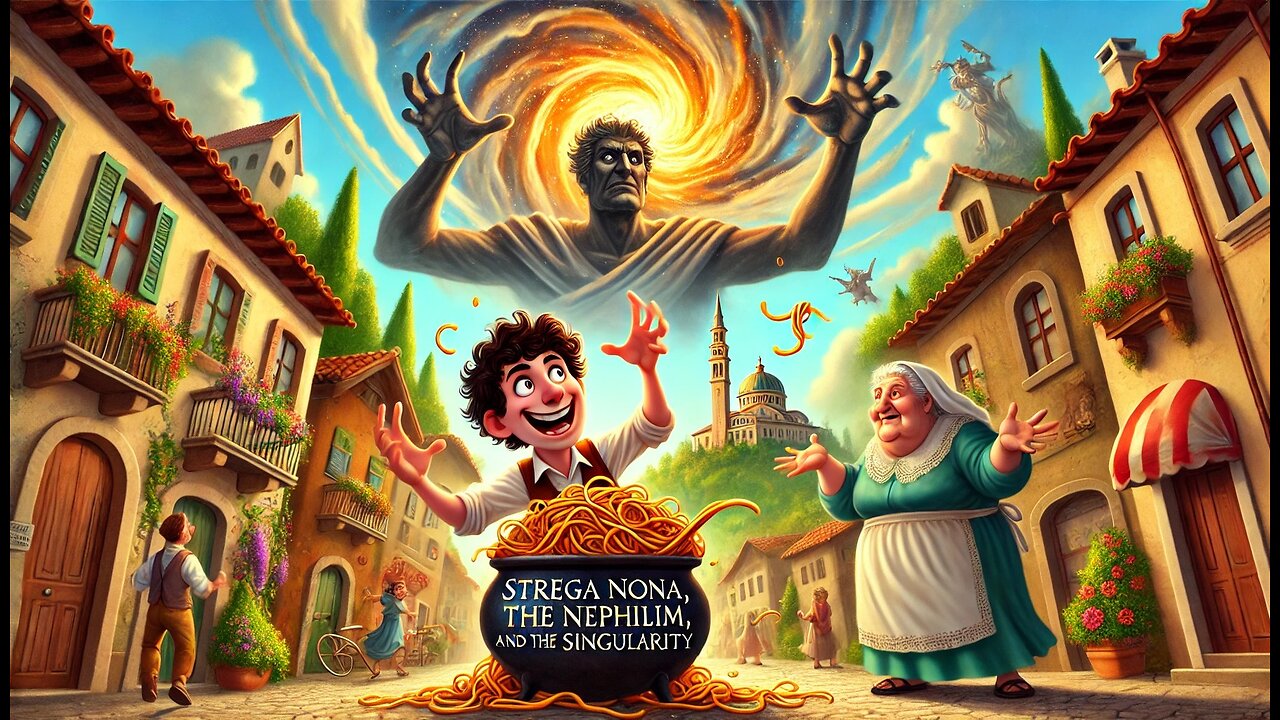Premium Only Content

Strega Nona, the Nephilim, and the Singularity
At first glance, Strega Nona seems like a simple village tale about magic and mischief. But when read carefully, it becomes clear that her story is a deliberate retelling of far older warnings — echoes of Biblical narratives about pride, disobedience, collapse, and the necessity of restraint. Through symbols accessible to a modern audience, Strega Nona and the Singularity: The Witch’s Warning reintroduces ancient lessons that first appeared in stories of the Nephilim, the Flood, and humanity’s repeated defiance of divine order.
In the Biblical account, the Nephilim are a generation that crossed forbidden boundaries, taking for themselves powers that were not meant for them. Their corruption was not only personal but systemic, spreading violence and disorder across the earth. In Strega Nona, Big Anthony mirrors this same dynamic: an eager but foolish figure who witnesses a fragment of power, misunderstands its nature, and unleashes disaster not only upon himself but upon his entire community. His mistake, like that of the Nephilim, is not merely technical — it is moral. It is a failure to respect the structures of wisdom, restraint, and obedience that maintain the world’s balance.
The flood of pasta in Strega Nona directly parallels the Biblical Great Flood. In both cases, unchecked human action triggers overwhelming consequences that cannot be easily reversed. Neither flood is portrayed as purely punitive; instead, each represents a rebalancing of a world thrown into chaos by pride and half-knowledge. Strega Nona’s intervention — singing the second song to stop the pot — recalls the act of divine mercy that preserves a remnant after the Flood: a restoration through painful discipline, not destruction for its own sake.
Beyond the parallels of flood imagery and collapse, Strega Nona also reinterprets the Biblical theme of covenant — the sacred agreement between knowledge, responsibility, and restraint. In Genesis, humanity repeatedly breaks covenant with God, leading to exile, disaster, and the need for renewal. In Calabria, Big Anthony breaks the covenant of trust he made with Strega Nona. His punishment is not exile, but endurance: he must personally bear the weight of the disaster he caused, restoring what he damaged through suffering and effort. This mirrors the Biblical principle that restoration requires more than regret — it demands action, humility, and perseverance.
Through her story, Strega Nona embodies a theological principle often forgotten in modern retellings: that wisdom is not the accumulation of power, but the alignment of action with moral law. Like the Biblical authors, she warns that it is not ignorance alone that destroys civilizations — it is prideful misuse of partial knowledge, the abandonment of rightful limits, and the refusal to heed ancient warnings. Whether in Eden, before the Flood, at Babel, or in Calabria, the pattern remains.
Thus, Strega Nona does not simply echo Biblical warnings — she reframes them for a technological age. In the face of the coming Singularity, her tale calls modern humanity to remember the ancient rhythms of creation: that unchecked mastery leads to collapse, that wisdom requires restraint, and that every generation must relearn the old truth — beginnings are easy; endings must be earned.
-
 42:52
42:52
The Finance Hub
13 hours ago $0.06 earnedBREAKING: ALINA HABBA JUST SHOCKED THE WORLD!
109 -
 LIVE
LIVE
BEK TV
22 hours agoTrent Loos in the Morning - 8/26/2025
671 watching -
 LIVE
LIVE
The Bubba Army
21 hours agoBURN The FLAG, Go to JAIL! - Bubba the Love Sponge® Show | 8/26/25
5,953 watching -
 12:15
12:15
Nikko Ortiz
17 hours agoMonday Gun Fails
55K11 -
 8:19
8:19
MattMorseTV
16 hours ago $10.48 earnedTrump is ACTUALLY DOING IT.
52.7K46 -
 5:40
5:40
Sugar Spun Run
23 hours ago $0.80 earnedNutella Brownies
4.1K -
 8:46
8:46
Faith Frontline
15 hours agoBill Maher STUNNED as Charlie Kirk Proves God Exists
3.76K9 -
 LIVE
LIVE
FyrBorne
9 hours ago🔴Warzone M&K Sniping: On the Hunt For The Next Fun Builds
69 watching -
 7:11
7:11
MudandMunitions
12 hours agoNY Legal, Still LETHAL! Colt M4 + Griffin Armament GPS3X Prism Sight! NIGHT SHOOT
2.55K3 -
 2:11
2:11
WildCreatures
2 days ago $0.47 earnedBrilliant Blue Hyacinth Macaw Eats Nuts With Impressive Dexterity
4.52K5